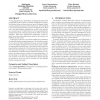93 search results - page 17 / 19 » Unifying Zero-Knowledge Proofs of Knowledge |
MMSEC
2006
ACM
14 years 1 months ago
2006
ACM
Current zero-knowledge watermark detectors are based on a linear correlation between the asset features and a given secret sequence. This detection function is susceptible of bein...
CRYPTO
1995
Springer
13 years 11 months ago
1995
Springer
Abstract. In this paper we present an eficient protocol for “Committed Oblivious Transfer” to perform oblivious transfer on committed bits: suppose Alice is committed to bits 0...
TCOS
2010
13 years 2 months ago
2010
Password Authenticated Key Exchange (PAKE) is one of the important topics in cryptography. It aims to address a practical security problem: how to establish secure communication be...
TCC
2009
Springer
14 years 8 months ago
2009
Springer
The concept of witness-hiding suggested by Feige and Shamir is a natural relaxation of zero-knowledge. In this paper we identify languages and distributions for which many known co...
DIM
2006
ACM
14 years 1 months ago
2006
ACM
An emerging approach to the problem of reducing the identity theft is represented by the adoption of biometric authentication systems. Such systems however present however several...

